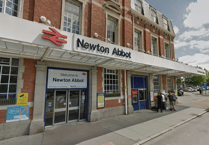NEWTON Abbot Town Council is investigating the possibility of taking ownership of the 16th century Old Forde House.
The Grade One listed Tudor manor sits near the Penn Inn junction and Brunel Industrial Estate and is currently in the possession of Teignbridge District Council.
It has been used as offices and a venue for wedding and events but fails to meet the accessibility criteria of the Disability Discrimination Act.
A recent refurbishment of neighbouring Forde House, the District Council’s headquarters, and introduction of hybrid working, has also reduced demand for use by officers.
Now the authority wants to dispose of the centuries-old treasure as it said running costs of £120,000 a year were no longer sustainable.
It also claimed that ‘significant amounts of capital expenditure’ were required for future upkeep.
Now Teignbridge Deputy Leader Cllr David Palethorpe has written to the Town Council announcing the move.
He said Old Forde House had been accepted as an ‘asset of community value’ meaning that interested parties could have a six-month exclusivity period in which to develop plans that would secure public use for the future.
If that failed to materialise then Teignbridge could put Old Forde House on the open market and sell to the highest bidder although no price has been indicated.
Members of Newton Abbot Town Council have asked Clerk Phil Rowe to investigate both the potential benefits and risks of ownership.
He said: ‘We have begun the process of requesting information from surveyors and other experts in order to understand whether taking on Old Forde House would genuinely be in the community’s interests.
‘We are also looking at what financial support might be available and, given the building’s Grade One listing, whether it could ever be properly adapted for modern public use.
‘If the sums add up and we’re told the building can be modified, then taking ownership is something that Newton Abbot Town Council would be very keen to consider.
‘But we must ensure we’re acquiring an asset for the town and not a liability.
‘We cannot risk placing an unfair burden not only on today’s council tax payers but potentially also on those for generations to come.’
Old Forde House, originally known as Forde House, was built in the mid-1500s. In the early 1600s it was redeveloped for Sir Richard Reynell, then MP for Mitchell in Cornwall.
The changes included an E-shaped floor plan, possibly in in honour of Queen Elizabeth I who died in 1603.
In September 1625 King Charles I stayed at the house while on a trip to Plymouth.
During the Civil War, Oliver Cromwell and Colonel Fairfax rested there before the second Siege of Exeter.
Newton Abbot Town Council has a successful track record of taking on and repurposing old buildings.
In 2016 it acquired the former St Leonard’s Church in Wolborough Street, developing it into Newton’s Place, now home to the town’s museum, public events space and council offices.
The £2.2 million project was delivered without increasing council tax bills.




